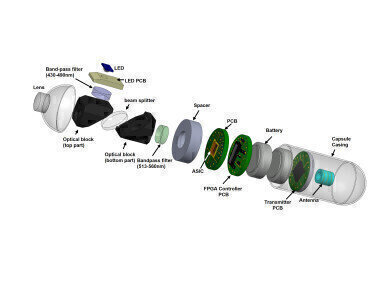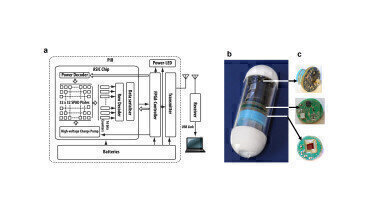News & Views
Breakthrough for Video-Pill Cancer Imaging
Jan 26 2016
Researchers have found a way to make swallowable cameras more effective at detecting cancers of the throat and gut. As an alternative to more intrusive imaging methods such as endoscopes, these tiny sensing systems, or video-pills, have relied on using a small visible light source for illuminating the human gut tract.
Now a team the University of Glasgow have used an advanced semiconductor single-pixel imaging technique* to create flurorescence imaging in a small pill form, thus expanding its the diagnostic capabilities. The project was led by Professor David Cumming in Electronic and Nanoscale Engineering at the University of Glasgow.
Research Associate, Dr Mohammed Al-Rawhani said: “The system we’ve developed is small enough and power efficient enough to image the entire human gastrointestinal tract for up to 14 hours. We’ve confirmed in the lab the ability of the system to image fluorescence ‘phantoms’ – mixtures of flavins and haemoglobins which mimic closely how cancers are affected by fluorescence in parts of the body like the intestines, the bowel and the aesophagus.
“The system could also be used to help track antibodies used to label cancer in the human body, creating a new way to detect of cancer. It’s a valuable new technique which could help clinicians make fewer false positives and negatives in cancer diagnosis, which could lead to more effective treatment in the future.”
Professor David Cumming said: “We’ve played an important role in developing the technology behind video-pill systems, and this is an exciting new development, which offers a valuable new resource for gastrointestinal imaging.
“There’s still some way to go before it will be ready for commercial production and clinical use, but we’re in early talks with industry to bring a product to market. We’re also interested in expanding the imaging capabilities of video-pill systems to new areas such as ultrasound in the near future.”
*Wireless fluorescence capsule for endoscopy using single photon-based detection’ is published in Scientific Reports.Nature.
Digital Edition
LMUK 49.7 Nov 2024
November 2024
News - Research & Events News - News & Views Articles - They’re burning the labs... Spotlight Features - Incubators, Freezers & Cooling Equipment - Pumps, Valves & Liquid Hand...
View all digital editions
Events
Nov 18 2024 Shanghai, China
Nov 20 2024 Karachi, Pakistan
Nov 27 2024 Istanbul, Turkey
Jan 22 2025 Tokyo, Japan
Jan 22 2025 Birmingham, UK





.jpg)














